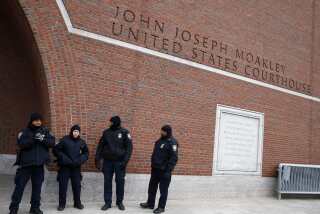U.S. agent spent taxpayer funds on prostitutes, lawyer alleges
- Share via
An undercover FBI agent investigating weapon smuggling in the Philippines spent taxpayer dollars to pay for prostitutes for the suspects and himself at a club later raided for hiring underage girls, a defense attorney has alleged in court filings.
Federal prosecutors acknowledged in court filings that the government reimbursed the agent for $14,500 for entertainment, cocktails and tips over a period of less than a year in 2010 and 2011 in connection with the case. The expenses included $1,600 on a night out in September 2011 at a club known as Area 51 in Manila.
In May, Filipino authorities targeted Area 51 on suspicion of employing minor sex workers and discovered 19 underage girls at the club. In a press release, the Philippines National Bureau of Investigation said minors danced in the nude and offered “sex services” for a fee.
A public defender representing the lead defendant in the weapon-smuggling case last week filed a motion asking a judge to dismiss the case based on “outrageous government misconduct,” citing the agent’s actions.
Based on a defense investigator’s interviews with witnesses in the Philippines, Deputy Federal Public Defender John Littrell alleged that the undercover agent paid for sex for himself as well as the suspects in the case. Littrell alleged the agent took his client and others to the clubs to induce them to participate in a weapons-smuggling scheme.
“The government’s actions in this case, if committed by a private citizen, would be serious federal crimes. These crimes were not victimless,” Littrell wrote in the motion. “The government’s conduct in this case went far beyond any standard of decency and warrants dismissal of the indictment.”
A U.S. Department of Justice spokeswoman said in an emailed statement: “We will contest the factual assumptions and legal significance of the defendant’s challenges in due course.” Prosecutors have not yet filed court papers responding to Littrell’s allegations.
A spokeswoman with the FBI in Los Angeles declined to comment because the prosecution was pending.
Allegations in the filing were first reported by TickleTheWire.com, a website that reports on federal law enforcement issues.
Littrell represents Sergio Santiago Syjuco, one of three men who were arrested and indicted in January on suspicion of illegally importing high-powered weapons and explosives from the Philippines to the U.S. Syjuco, Cesar Ubaldo and Filipino customs official Arjyl Revereza were charged with smuggling assault rifles, grenade launchers and mortar launchers in June 2011.
In a press release at the time of the indictment, the Justice Department said the Philippines National Bureau of Investigations provided “significant assistance” in the case.
The undercover agent approached the men under the pseudonym “Richard Han,” posing as a broker looking to obtain weapons for use by Mexican drug cartels in the United States.
Syjuco and Ubaldo, Littrell contended, were not sophisticated weapons dealers but rather private school graduates from wealthy families in the suburbs of Manila with no criminal backgrounds. The agent approached them when an earlier target backed out after one sale, according to the attorney.
Some of the expenses the FBI agent filed correspond with the dates of criminal activity alleged in the indictment.
For instance, on Nov. 16, 2010, when the agent spent $1,600 on “Dinner and Entertainment,” Ubaldo allegedly offered to put the agent in contact with suppliers of high-powered firearms. On May 9, 2011, when the indictment alleges that the three defendants met with the agent to discuss weapons deals and exporting firearms, destructive devices and ballistic vests to the U.S., the agent spent $3,400 in “Entertainment and Cocktails,” according to a letter from prosecutors to the defense.
According to the indictment, the men accepted nearly $90,000 for weapons and explosives that were eventually shipped to Long Beach labeled as “Used Personal Effects.” Revereza is accused of having received $8,400 in bribes to facilitate the shipment through customs.
Trial for the three men is scheduled for November. According to authorities, they face up to 20 years in federal prison if convicted.
More to Read
Sign up for Essential California
The most important California stories and recommendations in your inbox every morning.
You may occasionally receive promotional content from the Los Angeles Times.











